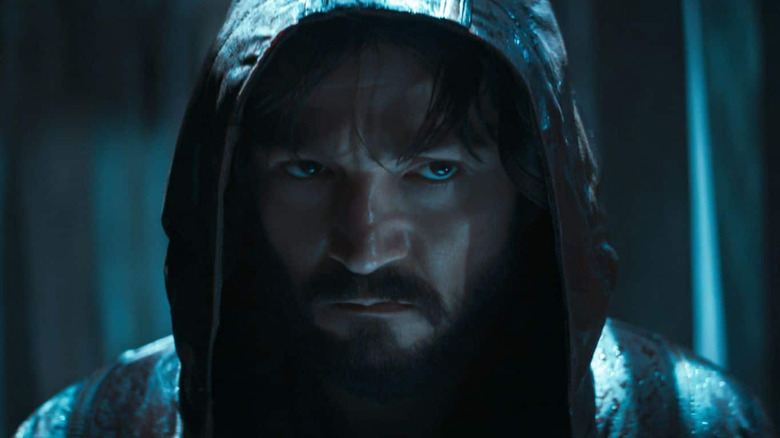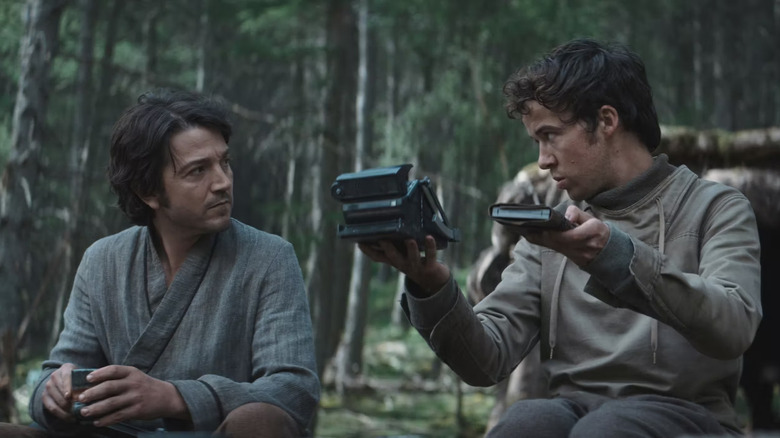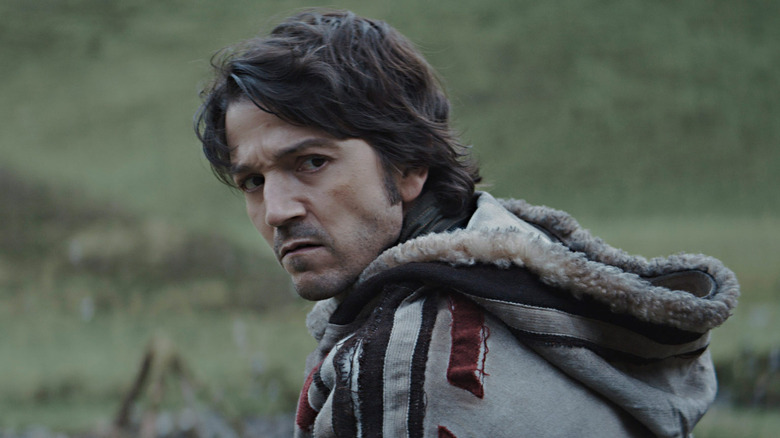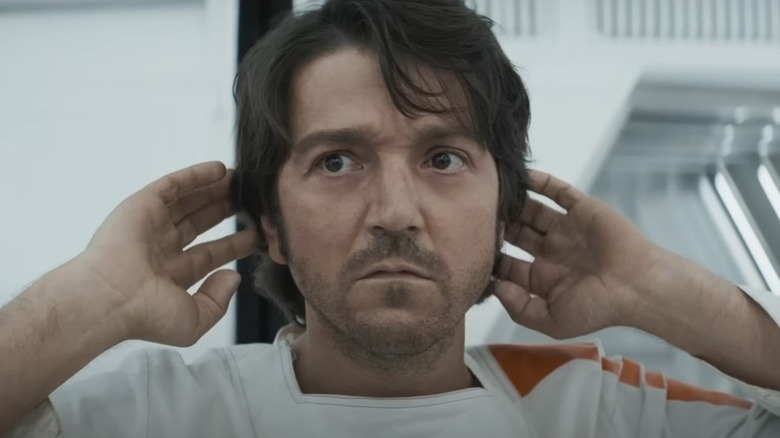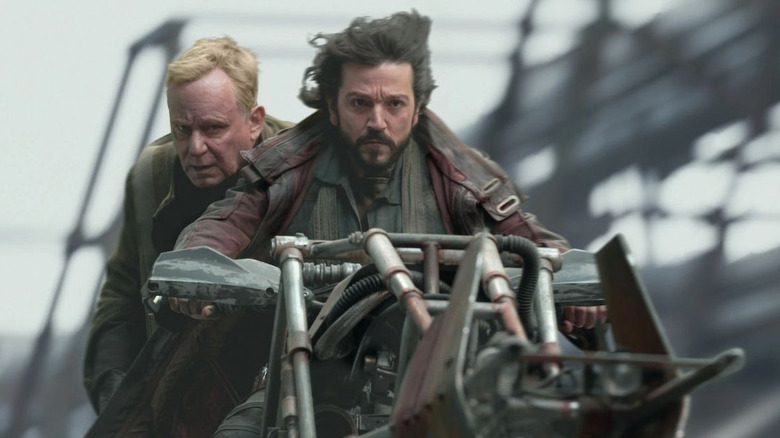Diego Luna Talks The Importance Of Andor's Timeless Relevance, The Rise Of Hispanic Stories, And More [Exclusive Interview]
Diego Luna has been making waves on Disney+ as the titular character in the live-acton "Star Wars" series, "Andor." After making his debut as rebel character Cassian Andor in "Rogue One: A Star Wars Story," the series winds the clock back five years (and even beyond) to reveal how Andor came to fight for the Rebel Alliance. Perhaps the most interesting aspect of Andor's story is that he wasn't always so passionate about the fight against the Empire. In fact, he did everything he could to stay off the radar and keep away from the fight. But when there's no escaping an oppressive regime that wants everyone under their boot, you have no choice but to fight for survival.
As the first season of "Andor" is nearing an end, we spoke to Diego Luna about Andor's journey toward becoming a rebel and how it takes cues from his own life and the causes he's passionate about. While the series seems wholly relevant to our tumultuous political climate today, Luna see the series as an accurate representation of many generations who have faced oppression over the years. But in the world of "Star Wars," creator Tony Gilroy has been able to pinpoint the specifics of the Empire's tyranny to show audiences exactly what the Rebellion is fighting against beyond the generic blockbuster depiction of villainy. And that makes all the difference.
Also, has Diego Luna gotten a chance to touch Jabba the Hutt's belly yet? Find out below.
'This is relevant because we tend to fall into the same kind of pattern'
So it's been four years since "Andor" was announced to everybody by Lucasfilm, and seven years since "Rogue One." I'm sure coming back to "Star Wars" was exciting by itself, but when did this feel like it became a truly necessary story to tell in the "Star Wars" universe, especially given the political climate that has developed in the year since?
I think from the beginning, man, because it doesn't seem to just to talk about today, even though there are references that definitely resonate and specific things in the story that you go like, "S***, my God, this galaxy far, far away has everything to do with the place I live in." But I don't think they necessarily belong to today or yesterday. This is relevant because we tend to fall into the same kind of pattern. I think Tony [Gilroy] was very smart in deciding how he was going to represent oppression, which is half of what the show is about. It's about understanding the awakening of a revolutionary and the building of a rebellion. You have to understand what they're reacting to. He's been very, very meticulous in telling the story of what that is, precisely.
I think that is what makes the show very rich: that the specific matters a lot, that we do see the big events, we witness the big events, but we get ready for that. That patience is one thing I really like. I think it's important, because it reminds us what we regular people are capable of. But that's not just important today because of what you and I are living through. It was important 10 years ago and five years ago, and it'll be important in another five years. To me, clearly, there's a lot of work to be done in the world that you and I live in, and it's just going to happen if we get involved. So in a way, this show is pertinent. It's always pertinent.
'I bring a very specific accent, very specific background, and a way to see the world...'
Absolutely. In fact, throughout your career, you've done so many projects that have touched upon things like immigration, oppression, government prejudice, and corruption. You're also very active in the real world when it comes to addressing these issues. As an executive producer of the show, how much of your perspective about those things did you bring to the table? Are there any specific examples of that you had that affected the trajectory of the series as a producer?
I think by hiring me, they made the choice of making me a part of it. By hiring me, since "Rogue One," I bring something very specific to this role. I bring a very specific accent, very specific background, and a way to see the world, because you can give the same line to 20 actors, and it's going to sound very different. There's no one that is going to sound the same as other, because you bring what you are, and you play with what you have. When you refer to something, you're clearly picturing an image, and it's an image that you were exposed to. No one else can do it the way you do it. So I think that obviously is there.
When I was invited to play Andor and to be part of the production team of "Andor," it was four years before we were ready to tell a story. So yes, of course I've been involved in many conversations. I've been part of the whole process of the writing and putting together the team and the execution and the post-production and finalizing it. I was laughing to Tony — I sent an email to Tony and [producer] Sanne [Wohlenberg] two weeks ago, "I'm finally done with season 1!" And this was two weeks ago, because I finished dubbing the Spanish for the Latin American markets, the dubbing for episodes 10, 11, and 12. That was like a week and a half ago. So I was still working on that one.
It's been a process of almost five years of my life, this first season, and I've been really involved. To me, the story of Cassian is the story of a refugee, of someone that has been forced to migrate, and we see it from scratch. He's forced to leave everything behind more than once in his life. What does that mean in the life of someone? What does that develop in the personality of someone? It's something I really wanted to reflect on. The whole idea of reacting to oppression, of finding out that, again, that you are left alone, the absence of state. That is something, I mean, come on, I live in Mexico, a country that has a big problem in terms of that — what justice means, what is that? Here we are telling the story of characters that are having to protect themselves because there's no one out there to trust in. There's no structure that you can count on.
I think the prison block, it's a great metaphor of that world. A world where we are needed if we can produce, if we are generating — and generating not necessarily something that would have an impact in our lives. You're meant to stay where you are, even though you are creating wealth for others. Anyway, so I think there are many topics in our series that matter to me. Yeah, definitely.
'I think there's one thing he learns in prison, that he can be a leader...'
The prison break feels like such a pivotal moment for Cassian and perhaps maybe the moment when he truly starts to become a rebel, but I also feel like he's kind of been a rebel his whole life, even if he doesn't think so. Can you talk about that?
Yeah, I think in prison he realizes he can be in control. I think there's one thing he learns in prison: that he can be a leader, that he can put together a team. Like the transformation we see on Kino and how he triggers that on him, how he manages to go in. I mean, obviously things happen around him, but when he sees someone like Kino can transform, can be awakened, everyone can be awakened, right? Therefore, there is an option. There is a possibility. There is hope. I think that the journey of Kino means so much to Cassian and it's really important for him to witness that and to be part of that and to feel that he was able to trigger a necessary awakening that would bring change for so many and suddenly happens.
He also realizes what oppression is like, how little or nothing they mean for the Empire. The Empire is willing to sacrifice 200 people because of a mistake, and he realizes it's either they do something or they're dead; they're alive, but in a way, that can't really be called alive. And I love the representation of that prison. Complete pristine and clean place where it's all about production. They're everything but humans. They are a white suit and a number.
'If we are the ones paying subscriptions, why not to see our stories portrayed in those series?'
How does it feel to be part of this group of Hispanic stars who are taking pivotal roles in these huge franchises? We have you in "Andor." We have Gael Garcia Bernal in the Marvel universe. We have Pedro Pascal as "The Mandalorian." Tenoch Huerta is in "Black Panther: Wakanda Forever" this weekend. What's it like to see this rise and become such a big part of these huge pop culture universes?
I think finally things are changing, man. Finally, the industry is reacting to the world we live in. I believe, in 18% of American homes, they speak Spanish. You can check if I'm saying something accurate or not, but I think that's what I read recently, which tells you a lot about what should be happening in the industry business. How many people speak Spanish in the world, how important Latin America is for the market, and Spain — that should be represented. If we are the ones going to the cinema, why not see ourselves there? If we are the ones paying subscriptions, why not to see our stories portrayed in those series?
I think as an audience, we have a great responsibility of sending the right messages. When we buy a ticket, we are sending a message. When we see a piece of work that has someone with a Latin American connection, we're sending a message. When we don't, we're sending a message, too, when we don't buy the ticket. So the industry will react. The industry reacts with numbers. If we send the right messages, it's just going to keep happening. And gladly, the world is a different place these days. Our stories travel easily with the platforms. Now you do a very specific tiny thing in a country, and if it's good, you have a chance to connect with others in places they didn't even think they had a connection with.
So we have to use this responsibly. We have to keep reminding people our stories matter, and we have to do cool stuff that can represent us in the best possible way, also, because that matters, too. And I feel really proud of what I'm part of and very lucky to belong to this generation that is getting this chance.
To wrap up, I did want to find out: Have you been able to touch Jabba the Hutt yet? And if not, do you think there's ever going to be an opportunity where you get to?
[laughs] I don't think it's happening. I don't think it's happening, but I got over it. I've done so much fun stuff so far that I don't need that anymore.
[laughs] Fair enough. Well, that's my time. Thanks so much, Diego. I appreciate it and I can't wait to see how the season ends.
Man, thank you very much. I hope you enjoy the last push.
The final two episodes of "Andor" season 1 will be rolled out in the coming weeks on Disney+.
